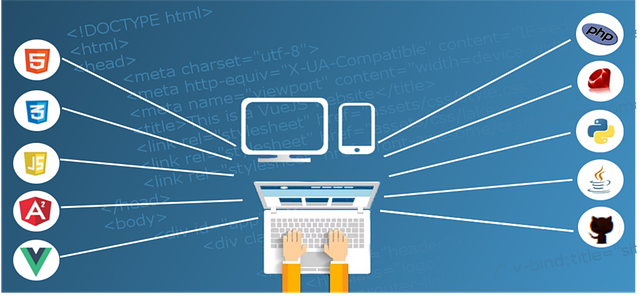How can software development help to advance your business? How can it be beneficial to businesses of any size and any scope? What benefits can it bring? These are all important questions to consider if you are running a business, even in today’s digital age.
In today’s world, there is an urgent need for companies to remain competitive in order to remain viable. According to the research conducted by the McKinsey Global Institute, “software development is an important tool for companies seeking to become more competitive, increase productivity, improve customer experiences, and drive innovation”. This is because software development is a highly effective way to leverage data and analytics, which allow for more informed decisions, quicker development processes, and improved user experiences. In addition, software development can also provide enhanced operational capabilities such as automation, which can help businesses reduce costs and remain competitive.
In this article, you will learn how software development can help businesses in all these areas and more. We will explore the benefits of utilizing software development in terms of enhancing user experience, driving innovation, increasing operational efficiency, and creating new revenue streams. Additionally, we will look at some of the practical steps that businesses can take to ensure they are getting the most out of their software development efforts.
Finally, we will look at some of the key challenges businesses face when incorporating software development into their business model and how to overcome them. By taking into consideration the different emerging technologies and trends in software development, businesses can ensure they are best equipped for success in a world that is becoming increasingly digital.
Definitions
Software development is the process of creating software applications to meet the needs of users. It involves creating programs and applications from scratch, using a variety of tools and technologies. Software development can be used to improve existing applications, or to create new ones to meet a particular need. It consists of designing, coding, testing, debugging, and deploying applications.
Application development: Application development is the process of developing software applications for specific users or organizations. It involves the creation of programs to solve user-specific problems or meet specific business needs. Application development is often divided into front-end and back-end development, where the former focuses on user interaction and the latter focuses on the logic of the application.
Software development methodology: Software development methodology is the approach taken by software development teams to create the desired software. It involves both design and coding activities, and there are a variety of software development methodologies, such as Agile, Scrum, Waterfall, and Extreme Programming.
Software architecture: Software architecture is the overall design of a software system. It involves deciding how the different pieces of the system fit together, as well as the overall structure of the software. Software architecture also covers the way in which the software interacts with hardware components and other software systems.
Software testing: Software testing is the process of validating and verifying that a software application meets its specified requirements. It involves making sure that the software works as expected and that bugs are fixed before the software is released. Software testing can involve both manual and automated methods.
Software maintenance: Software maintenance is the process of keeping software applications up to date and running smoothly. It involves making sure that software is up to date with the latest patches and bug fixes, as well as monitoring the system for any potential issues.
Software development can be used to enhance any business. Through application development and software engineering, businesses can create custom applications to meet their specific needs. It also enables businesses to create more efficient systems, as well as maintain their software and ensure that it is always up to date. With software development, businesses can improve their operations and increase their efficiency.
1. Maximizing Efficiency Through Automation
Maximizing Efficiency Through Automation
Software development is the process of designing, building, testing, and releasing software. By incorporating software development into your business, you can take advantage of the efficiencies of automation to maximize your business’s success. Automation can reduce time spent on mundane tasks such as data entry, freeing up resources to focus on higher-value activities. It can also increase accuracy by eliminating the potential for mistakes due to human error.
Improving Efficiency and Accuracy in Core Business Operations
Automated tools can improve core business operations in a way that manual processes cannot. By automating mundane tasks, you can reduce the amount of time and resources spent on these processes, freeing up resources to focus on more important tasks. Additionally, automated processes can reduce the potential for mistakes due to human error, resulting in increased accuracy of your operations. For example, automated account reconciliation can save time and provide an increased level of accuracy when reconciling accounts.
Enabling Scalability and Adaptability
Software development can enable scalability and adaptability in your business. By providing automated processes and tools, you can quickly adapt to changing market conditions and respond to customer needs more quickly. Additionally, automated processes provide scalability, allowing your business to grow and handle more customers without the need to hire additional employees. Automation can also support rapid scalability of your business by allowing your most successful processes to be easily reused and expanded upon.
Enhancing Customer Engagement
Automation can also enhance customer engagement by providing a consistently high-quality experience. Automation can reduce customer frustration when dealing with mundane tasks such as filling out forms or making payments. Additionally, automated processes can provide detailed tracking and visibility into the status of customer requests, creating a better customer experience. For example, automated customer service chatbots can provide quick and accurate answers to customer inquiries, reducing customer waiting time and increasing satisfaction.
List of Benefits
By incorporating software development into your business, you can take advantage of the following benefits:
- Reducing the amount of time and resources spent on mundane tasks
- Increasing accuracy by eliminating potential for mistakes due to human error
- Enhancing customer engagement with automated processes
- Enabling scalability and adaptability by providing automated processes and tools
2. Increasing Productivity Through Faster Development Cycles
Investment in Software Development
Investing in software development for a business can be a profitable venture that comes with great rewards. It increases the productivity of employees while reducing costs and improving customer satisfaction. Investment in software development provides companies with the competitive edge needed to stay ahead of the competition and can lead to increases in revenue. Software development involves creating software programs, apps, or websites that can help make operations more efficient, streamline processes, and provide more information to customers.
What Programs Can Do
Software development can be used to develop customer relations tools such as customer relationship management (CRM) software, which helps businesses manage their customer data more efficiently. This includes allowing companies to send automated emails, keep track of sales leads, and store customer data. It can also be used to create internal systems that streamline processes such as accounting, scheduling, and data storage. Companies can also use software development to create websites with a customized design, integrated tools, and a user-friendly interface.
Software development can also make employee management easier and more efficient. Companies can create programs that allow them to monitor employee performance, measure productivity, and track progress. This can help ensure that employees are staying on task and meeting deadlines, while providing management with the means to make better decisions. Additionally, software can automate labor-intensive tasks, such as payroll processing, Inventory tracking, and customer support.
In addition to the aforementioned benefits, software development can help cut costs and increase productivity. By investing in software programs, companies can reduce the number of hours spent on manual processes, freeing up employees for higher-value tasks. This can reduce costs associated with staff and employee wages while providing employees with the opportunity to utilize their skills in a more productive manner. Companies can also use software programs to better track customer activity, allowing them to manage their marketing efforts more effectively.
Overall, investing in software development can help businesses of all sizes improve their operations and increase their revenue. Software development provides companies with the competitive edge needed to stay ahead of the competition and create a better customer experience. From customer relations to internal systems, companies can use software development to make their operations more efficient and increase productivity.
3. Advancing Business Efficiencies With Optimal Technology Solutions
Deployment and Automation Enhancements
Software development has changed the landscape of business processes in the modern world. Software programs are commonplace and allow organizations to streamline operations, ensure accuracy, and make sure tasks are accomplished efficiently. Businesses today need to realize the potential savings from developing unique, customized software tools that are tailored exactly to their needs. From streamlining mundane processes, such as data entry, to automating complex tasks, software development provides organizations with the tools they need to reach their goals quickly and accurately.
The deployment of software solutions can reduce labor costs and time lost due to inefficient processes and training new employees. Automation of task-oriented jobs can reduce the amount of time spent on mundane processes so that staff can focus on other areas. In addition to time, automation can also automates the mundane processes and repetitive tasks, resulting in more accurate results in a fraction of the time. Automation is also an excellent way to prevent employee errors due to misinterpreted instructions.
Integration and Security Improvements
Integrating software solutions can help create a seamless environment in which multiple programs, processes, and systems interact. Integration will increase the business’ productivity and capabilities, as well as streamlining difficult processes from manual processes to automated workflows. Integration allows for better data management and sharing between departments and other organizations while providing better visibility and collaboration for the entire staff.
In addition, the development of custom software solutions can provide the organization with greater security. Custom software development will provide the organization with better access control, data encryption, authentication, and antivirus protection against outside threats. These measures will help to protect the organization’s sensitive data, improve the organization’s integrity in the eyes of its customers, and ensure the safety of employees.
Software development is key to helping businesses today remain competitive. With the ability to streamline processes, automate tasks, and improve security, businesses can take full advantage of the tools available to them to ensure their success. By deploying, integrating, and automating the right software solutions, businesses can advance their efficiency and productivity.
Conclusion
Developing custom software for any business has the potential to be a major success for any organization. An effective software solution can take a business to the next level by introducing processes and systems that maximize efficiency and create a successful brand image. But, how can software development help your business?
This is a thought-provoking question, but developing custom software for any business can offer amazing and measurable results. It can help streamline operations, boost customer relations, and provide an improved user experience to make sure every customer is as satisfied as possible. Make sure to follow our blog for more information on the latest software development trends and how they can enhance your business. Want to know more? Stay tuned and wait for our new releases!
The FAQ section below will give more insight about how custom software can help your business.
1. What Does Software Development For a Business Entail?
Software development for businesses involves creating, implementing, and maintaining secure software applications. This includes designing an application, coding the software, testing and debugging, ensuring user safety, and providing support and maintenance to customers.
2. How Can Custom Software Benefit Your Business?
Custom software can offer many benefits, including improved organization and workflow, increased sales, enhanced customer experience, increased employee productivity, and the ability to reach new markets.
3. What Are The Benefits of Having Custom Software?
Having custom software can make sure that your business runs more efficiently and is better equipped to handle all aspects of customer relations. It can also help to reduce costs, make tasks easier, ensure data accuracy, and allow employees to work more productively.
4. Should Custom Software be Considered For All Businesses?
It depends on the needs of the business. Before investing in custom software, it is important to evaluate the current systems in place and what type of software would be best for the organization.
5. What is the Difference Between Custom Software and Off-the-Shelf Software?
Custom software is built to meet the specific needs of a business, whereas off-the-shelf software is designed for general use and often needs to be adapted to fit the organization’s requirements. Custom software also typically offers higher levels of support and greater control over the performance of the application.



